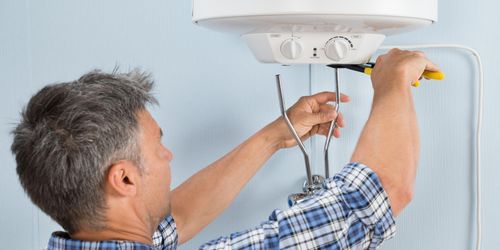Managing the Standard Water Heater Crisis Scenarios
Managing the Standard Water Heater Crisis Scenarios
Blog Article
Nearly everybody maintains their private piece of advice involving Common Hot Water Heater Problems.

A hot water heater is among one of the most crucial fundamental home appliances that can be discovered in a residence. With hot water heater, you do not need to experience the anxiety of heating water manually every single time there is a requirement to take a bath, do the laundry, or the dishes. There is always a possibility that your water heater would act up as with most mechanical tools.
It is important to keep in mind any kind of little breakdown as well as tackle it quickly prior to points get out of hand. Most times, your hot water heater starts to malfunction when there is a build-up of sediments as a result of continual usage. As a precaution, regular flushing of your hot water heater is advised to stop debris build-up and also protect against useful failing.
Usual hot water heater emergency situations as well as exactly how to take care of them
Insufficient warm water
Taking care of a not enough supply of warm water can be irritating. It might be that the water heater can't support the warm water need for your apartment. To take care of this trouble, you could attempt to readjust your heater's temperature level dial and wait for a few minutes. If the issue lingers, you can request the help of a specialist plumber. You might upgrade your water heating unit to one with a bigger ability.
Varying water temperature level.
Your water heating unit could begin creating water of various temperature levels generally ice hot or cool hot. There may be a need to replace either the home heating or the thermostat system of your water heating system.
Leaky water heater tank.
In this scenario, you should transform off your water heater, allow it to cool down, as well as meticulously look for the resource of the problem. At times, all you need to do is to tighten up a few screws or pipeline connections in cases of small leaks. If this doesn't function and also the leakage lingers, you might need to utilize the solutions of a specialist for an appropriate replacement.
Tarnished or odiferous water
When this takes place, you require to understand if the concern is from the water or the storage tank source. If there is no amusing odor when you run cold water, after that you are certain that it is your water heating system that is malfunctioning. The stinky water can be created by rust or the buildup of bacteria or sediments in the water heating system tank.
Verdict
Some home owners overlook little warning and minor faults in their water heater system. This just results in additional damage as well as a feasible total malfunction of your appliance. You should handle your hot water heater faults as soon as they come near stay clear of more expenditures and also unnecessary emergency difficulties.
With water heating systems, you don't need to go with the stress and anxiety of heating water manually every time there is a need to take a bath, do the washing, or the dishes. It may be that the water heating system can not support the warm water need for your house. Your water heating system can start creating water of various temperature levels usually ice cold or hot hot. If there is no amusing scent when you run cool water, then you are certain that it is your water heater that is faulty. The odiferous water can be created by corrosion or the buildup of germs or sediments in the water heating unit storage tank.
Common Water Heater Issues and What You Should Do
What Type of Water Heater Do You Have?
Before we begin it’s first important that you identify the type of water heater you have on your property. There are two main types of water heaters out there: conventional and high efficiency.
Both of these types of products typically use either gas or electricity to heat power. There are also solar water heaters that use a thermal collector on the roof or yard to heat the water.
While these models are not as common, they can cut heating costs in half. In this article, we will focus on conventional and high efficiency.
How Do My Electric and Gas Water Heater Work?
Though they look similar, electric and gas water heaters work very differently. It’s important to know their basic function because often problems can be specific to the heating source.
In the electric model, a thermostat on the side of the machine detects the temperature of the water in the tank. When the temperature needs to rise electricity flows to a heating element suspended in the water.
Gas models also use a thermostat device — typically with a mercury sensor at the tip and an additional sensor called a thermocouple. The thermocouple detects whether the pilot light is on and controls the flow of gas.
When the thermostat drops below the appropriate level gas is released which becomes ignited by the pilot light. The flame heats the bottom of the water tank which causes hot water to rise and cold water to drop.
This natural circulation continues until the water reaches the desired temperature. Then, the thermostat triggers the gas control valve to shut off the flow of gas.
What Are the Most Common Issues and How Do You Fix Them?
https://happyhiller.com/blog/common-water-heater-issues-and-what-you-should-do/

I'm certainly very intrigued by Is Your Water Heater Leaking? and I'm hoping you liked our blog posting. Liked our write up? Please share it. Help someone else locate it. We cherish reading our article about Warning Signs You Need Water Heater Repairs.
Maintain plumbing health; connect today. Report this page